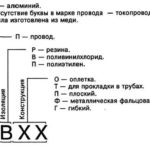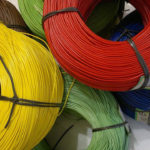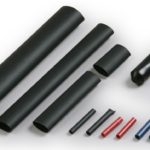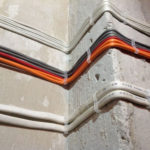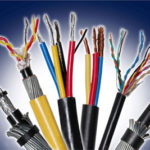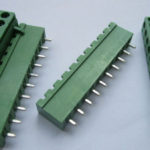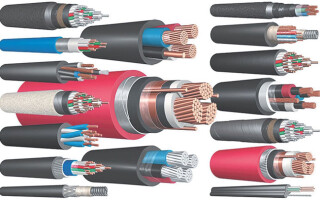Cable, wire, cord - all these are specialized products that are produced in a large assortment. Moreover, there are many varieties of such products, depending on their purpose, scope, components, core material and coating used.
These are mainly household wires, although other options are allowed. Before purchasing this or that cable, it is necessary to understand all the differences in parameters, properties, characteristics.
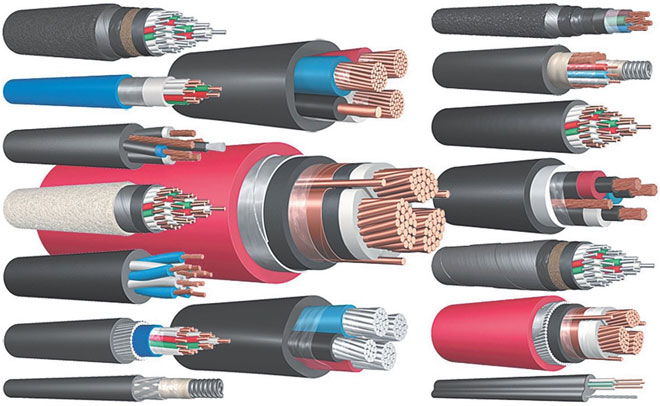
Content
Power cables
There are various types of cables that are used to bring electrical current to a building. Most often, VVG and its variants are involved. Below are the various types of cables of this type.
VVG - soft power wire. Outside, the product is black, although white options are sometimes found. This is a non-combustible multi-core cable. Standardly products are packed in large footage. Lived inside - from 1 to 5.In diameter, they are from 0.15 to 24 cm.
VVG is used when the electric current has a voltage of up to 1000 V. In domestic conditions, those types of copper cables are used, in which the core diameter is 0.15-0.6 cm.
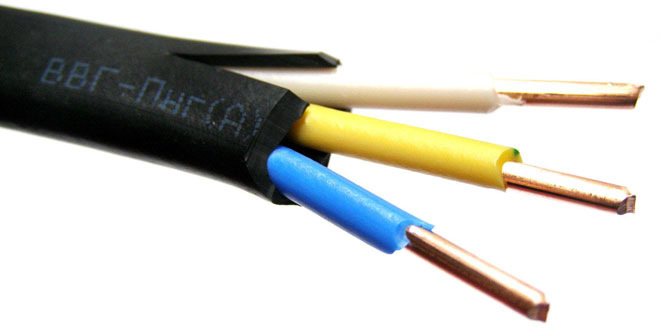
Operating temperature - within -50 ... + 50 ° С. If the indicator is + 40 ° C, then the product will withstand humidity even up to 98%. It is resistant to chemicals. It has strong bends during installation, so that the cable does not break, does not break.
There are such types of power cables of this type:
- AVVG. It can be stranded or single-core aluminum.
- VVGng. It not only does not burn, but has enhanced characteristics in this area.
- VVGp. This is a flat protected wire.
- VVGz. Inside, between the layers, there are still harnesses, which are made of rubberized material.
NYM is another kind of power copper cable. The outer layer is made of PVC, which does not ignite. A rubber filler is placed between the insulating layers, due to which the product becomes more durable and heat-resistant.

Inside there are only copper wires. There are no single wire modifications. The core diameter is 0.15-1.6 cm. This type of cable is used for wiring lighting or in other networks where 660 V. The product is used for laying outdoors, since it is resistant to moisture and temperatures. Permissible indicators - -40 ... + 70 ° С.
But keep in mind that such a product does not withstand direct sunlight, so it is better to at least cover it. When it will be necessary to bend the cable, the diameter of such a turn should be at least 4 sections of the product. If we compare NYM with VVG, then the first is resistant to environmental conditions and more comfortable.But it costs more and is produced only rounded, so it will not be possible to lay it in the walls.
In terms of flexibility, copper wire of the KG type is one of the best. It is intended for alternating current up to 660 V or direct current from 1000 V. Inside, 1-6 wires each, the outer sheath is rubberized.
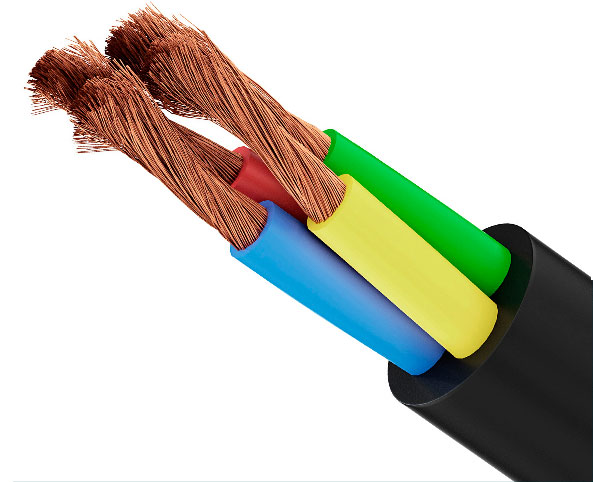
The product is suitable for temperatures -60…+50°C. As a standard, such a cable is used to connect devices (welding, generator and other devices). A modification of KGNG has been created, in which the insulation does not support combustion. This is the only difference between this variation of the KG cable.
VBBSHv is not just a single or multi-wire copper cable, but it is also armored. There are up to 5 veins, and their diameter is from 0.15 to 24 cm. An additional braid is used to armor the product. A pair of tapes are wound one on top of the other, covering the gaps. And they are already covered with a special PVC with a reduced level of ignition.

The product is suitable for temperatures -50…+50°C, withstands humidity up to 98%. But if you need to bend the cable, then the radius should be at least 10 product diameters. Types (notations differ) are:
- AVBBSHv. Aluminum core inside.
- VBBSHvng. Does not burn.
- VBBSHvng-LS. Not only does it not burn, but it also does not let smoke and gas through.
They use this option for laying in the ground, in the air, in pipes, but they make special protection from sunlight.
Electric wires
In the directory of cables and wires, you can study all the detailed information about such products. Popular are PBPP, PBPPG (although they are also called PUNP). What wires are, discussed below.
PBPP is a copper wire, and the cores have 1 wire each. It is called the installation, has a flat shape.
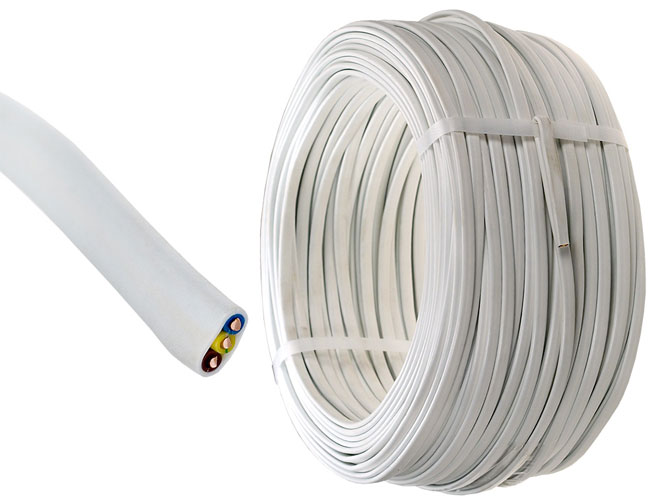
Standardly there are 2-3 cores. Their diameter is 0.15-0.6 cm. Such single-wire copper conductors are suitable for mounting sockets, but are best used for stationary lamps. Voltage - up to 250 V. Withstand temperatures -15 ... + 50 ° С. Bending the product, you need to make a radius, like 10 wire diameters.
PBPPg is different in that its cores are made of several wires, so it is a flexible wire. For such a product, you need to make a bending radius during installation, like 6 wire sections. Therefore, PBPPg is used in places where household appliances will be attached, or in areas where the laying of the wire involves frequent turns. Both grades of PBPP are available in both white and black finishes.
APUNP is also a modification of PBPP. The cable has an aluminum core inside. It is single-wire, so it is also not flexible.
PPV - a wire with a copper core. It has a flat shape, there are special jumpers for separation. The cores are also made of 1 wire. The diameter is from 0.075 to 0.6 cm. Inside there are 2-3 cores.
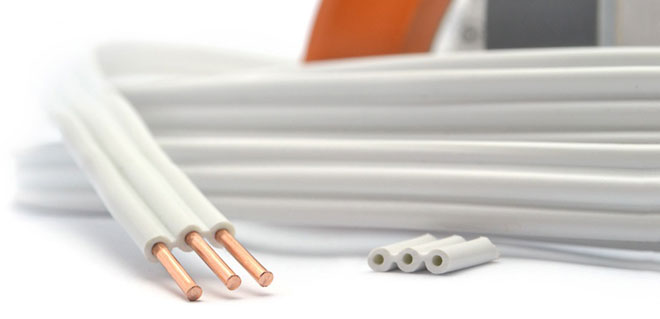
The voltage is maximum 460 V. The product withstands mechanical loads and the influence of environmental factors. Suitable for use at such temperatures: -50 ... + 70 ° C, and humidity up to 100% is allowed.
Use the PPV brand if you need to lay power lines, as well as when installing lighting devices. APPV is the same in properties as PPV, but it has aluminum cores inside it.
APV is also an aluminum version. Lived only 1 piece. The product is round, the core can be single- and multi-wire. In the first case, the diameter will be 0.25-1.6 cm, and in the second - 2.5-9.5 cm. Such a product can withstand mechanical loads, different chemical environments and temperatures of -50 ... + 70 ° С. Used for lighting networks, shields.Such cables are laid in pipes.
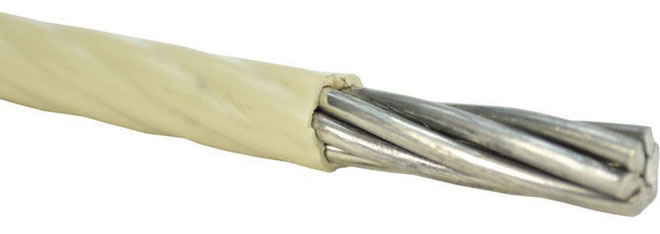
PVA is a wire with copper conductors. The product is rounded in cross-section, differs in density. The veins are made of several wires, the diameter is 0.075-1.6 cm.
Operating voltage - maximum 380 V. Sold only in white, but with different designation colors. The product does not support combustion, withstands temperatures of -40 ... + 40 ° С. The wire is able to withstand up to 3 thousand bends. Standardly used in the repair of networks, for the manufacture of extension elements.
These are the main electrical wires and their types.
Cords
A cord is simultaneously a hybrid between a cable and a wire, which has several cores inside. It is flexible, kink-resistant, so it is suitable for long-term use.
Cords are intended for connecting power sources to devices that can be moved from place to place: table lamps, kettles, etc.
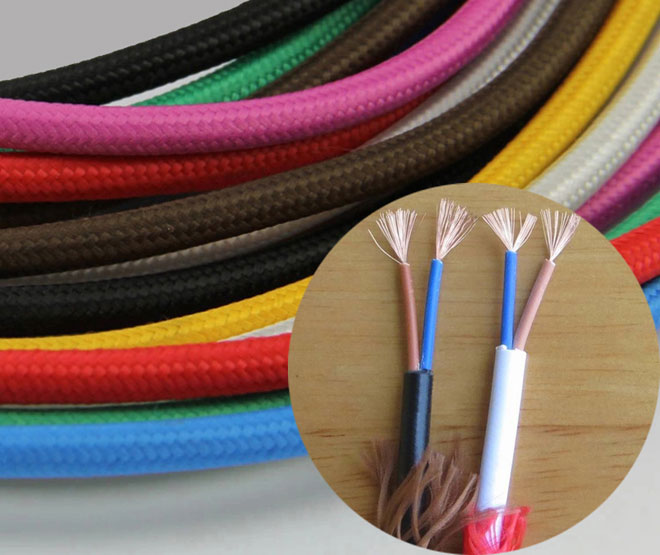
Professional tools are also connected using cords. But then they are called power cables.
Mounting wires
Various types of wires and cables for electrical wiring make it possible to carry out installation work even in the most unsuitable conditions. VVG, PVA, PBPP are not suitable for such cases, and then the following electrical cables, wires and cords are used:
- RKGM is a wire with 1 copper core. It includes several wires. The diameter is from 0.075 to 12 cm. There is a special rubberized shell, a fiberglass layer. The latter is impregnated with varnish, which can withstand different temperatures. The product is used at -60 ... + 180 ° C and voltage up to a maximum of 660 V.
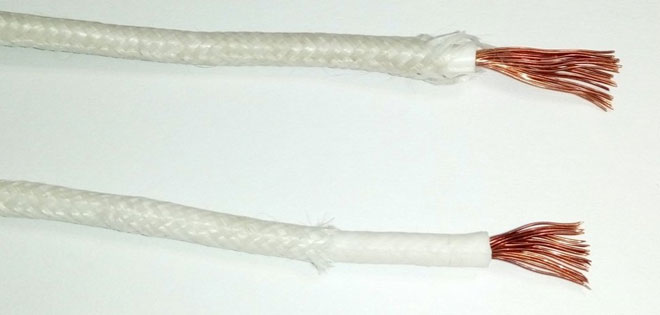
- PNSV also has only 1 core.Characterized as a heating element, diameter from 0.12 to 0.3 cm. Withstands voltage up to 380 V. Resistant to alkalis, high humidity, temperature -50 ... + 80 ° C and can even withstand immersion in water.
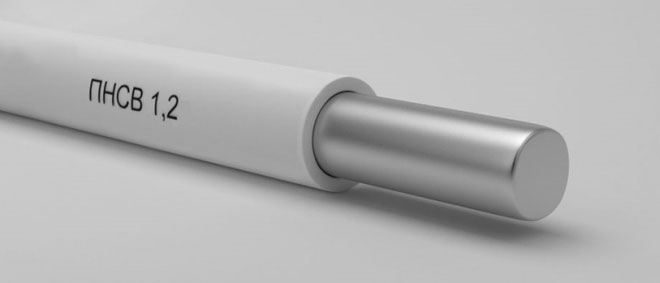
- Runway - a wire with a copper core. The operating voltage is up to 380 V, and the temperature is within -40 ... + 80 ° С. These cables are used at high pressure. For example, for a motor in an artesian well.
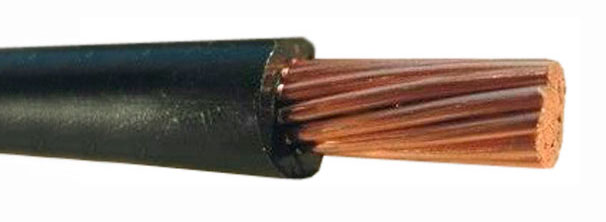
Network cables
Network cables are used not only for the transmission of electrical energy, but also for information impulses. If about 10 years ago only antenna and telephone cables were used, then with the advent of computers and other similar devices, more conductors were created. Moreover, many products are quite highly specialized.
There are such types of network cables:
- Coaxial. It has a metal conductor, a plastic braid is made on top, and then there is an additional layer of copper or aluminum, after which there is a protective coating. The diameter of the product is 0.7-1 cm, which is why it is not flexible. Another disadvantage is a strong susceptibility to external electromagnetic influences.
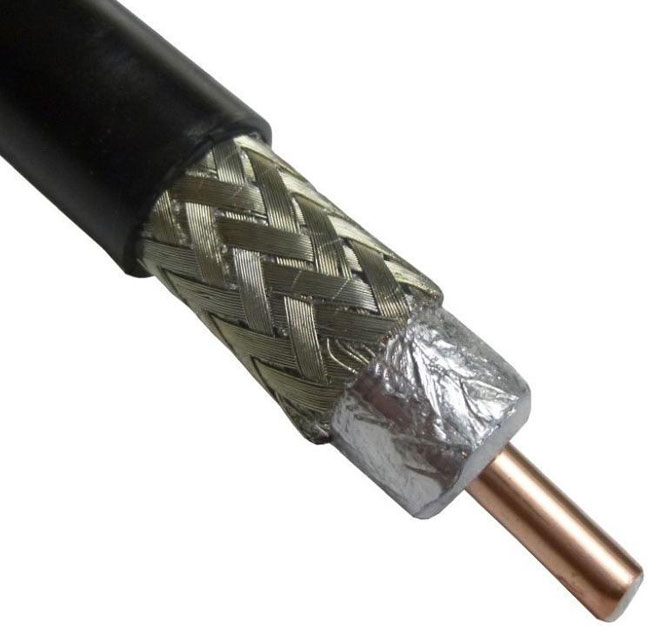
- twisted pair. This conductor can be either single or stranded. In this case, the cores are 2 pcs. intertwined with each other. Thanks to this, the connection is better. Diameter - 0.5 cm.
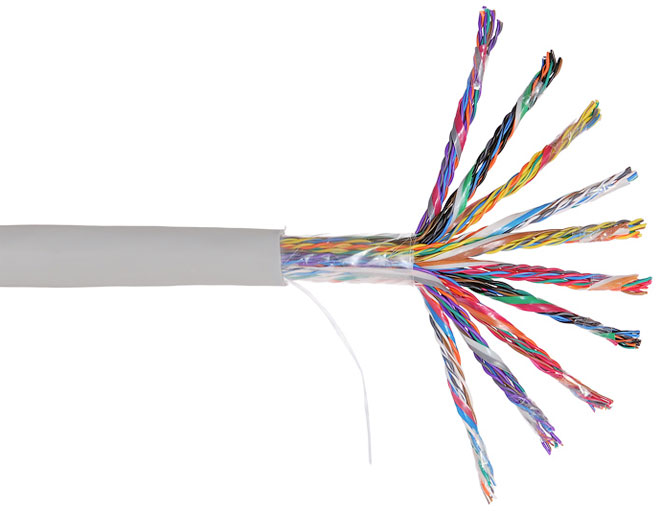
- Fiber optic cables. They make it possible to transmit information over a distance of up to 100 km. The cost of cables is high, so they are used in large firms.

Twisted pair and fiber optic cables were created later than coaxial (They were developed back in the 90s.).
Telephone wires and cables
There are 2 types of telephone cables and wires. Some use for laying several lines (no more than 400), and others - to breed already in apartments.
A few examples:
- TPPet. Used for a large number of subscribers. It has 2 wires that are intertwined. Soft copper wire is used. The insulation is made of polyethylene, as is the outer layer.
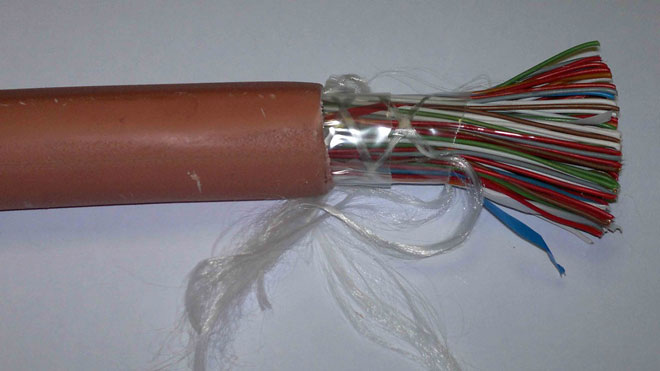
- TRV. This is a distribution cable. It can be 1- and 2-pair. It has a flat shape, the base is divided. Inside is a copper core with 1 wire. The product is used inside buildings.
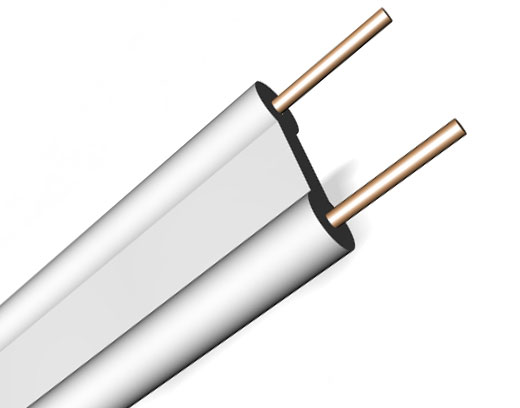
- TRP (wire "noodles"). The characteristics are similar to the previous one, but it has a polyethylene coating, so it also has resistance to environmental factors. This makes it suitable for outdoor use.
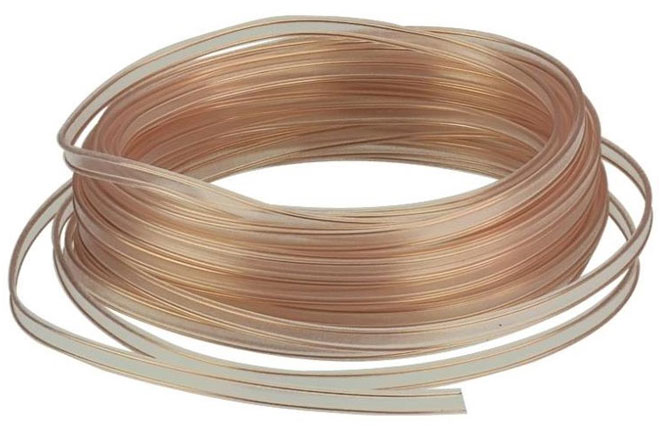
These are the main types of telephone cables.
Antenna cable
They are used not only to transmit electric current, but also signals with information. Now most often used options such as RG-6, RG-58, RG-59, as well as their Russian-made counterparts (products RK75). There are many options that differ in characteristics and properties.
The most popular coaxial antenna cable is RG-6. It is used for high-frequency signals in television, radio and other electronic equipment. Inside the core is made of copper with a diameter of 1 mm. It is top covered with polyethylene, aluminum foil and an outer conductor made of copper. The outer layer is made of PVC.
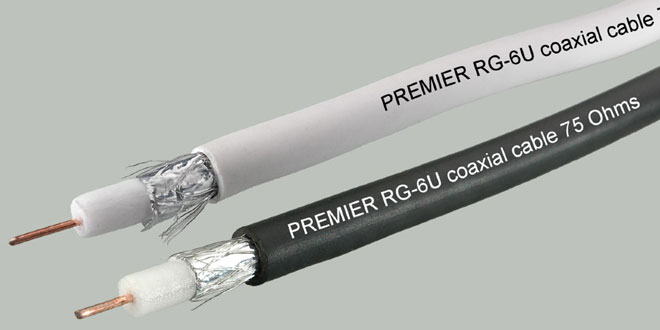
Such a product is used to transmit cable and satellite television information.
Optical cables
Optical cables are used for outdoor and indoor lighting. This is a power type that has a transparent coating on the outside. At the same time, auxiliary wires are located every 20 mm, to which LEDs with different shades are connected.
With such a cable, you can build an interesting picture due to its decorative properties. In addition, if it breaks, then you do not have to look for the place of damage, since the diodes will stop working there. This is convenient for portable electrical appliances.
Electroluminescent cables are another variety. They differ in that they glow evenly along the entire length. They make inscriptions and pictures.
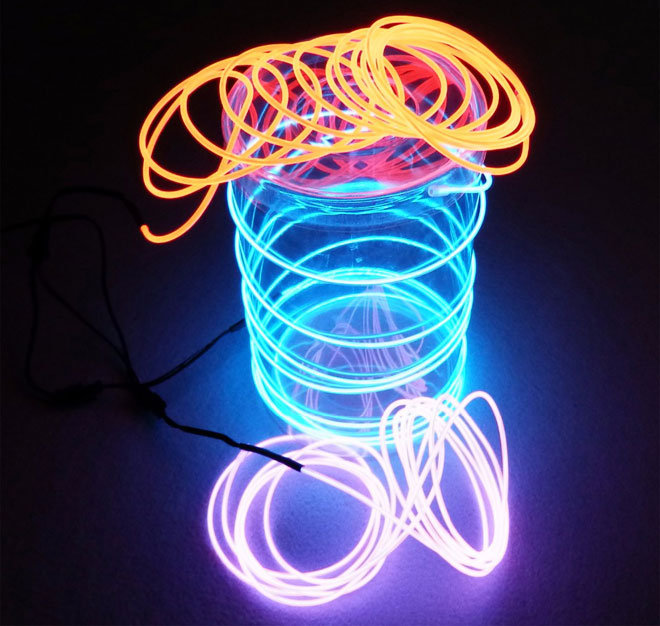
Alternatively, neon tubes. They are flexible and also serve as decoration.
Acoustic cable
In order for the speakers to work well, it is necessary to select the appropriate cables. The sound quality is affected by the internal structure of the wires, the type of material used inside, and the insulation.
The following varieties are used:
- TRS. Copper is used, which is obtained by the method of rough cleaning. This is the cheapest wire option.
- OFC. Oxygen-free copper is used for manufacturing. The product has good conductivity, belongs to the middle price category.
- PCOCC. The wire is made of pure copper by Chinese drawing technology.
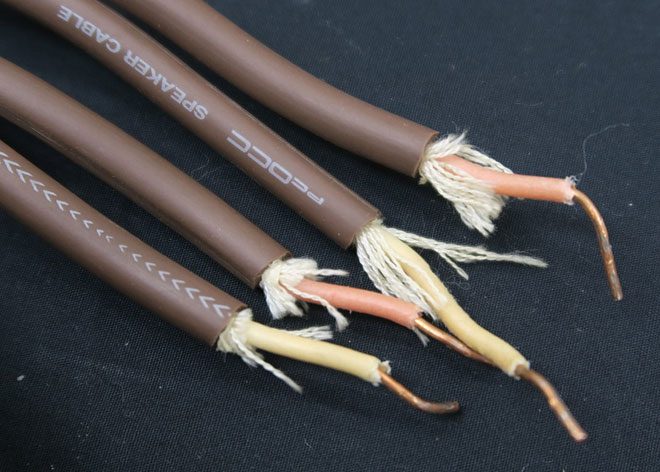
These are the main options for such products.
Similar articles:
